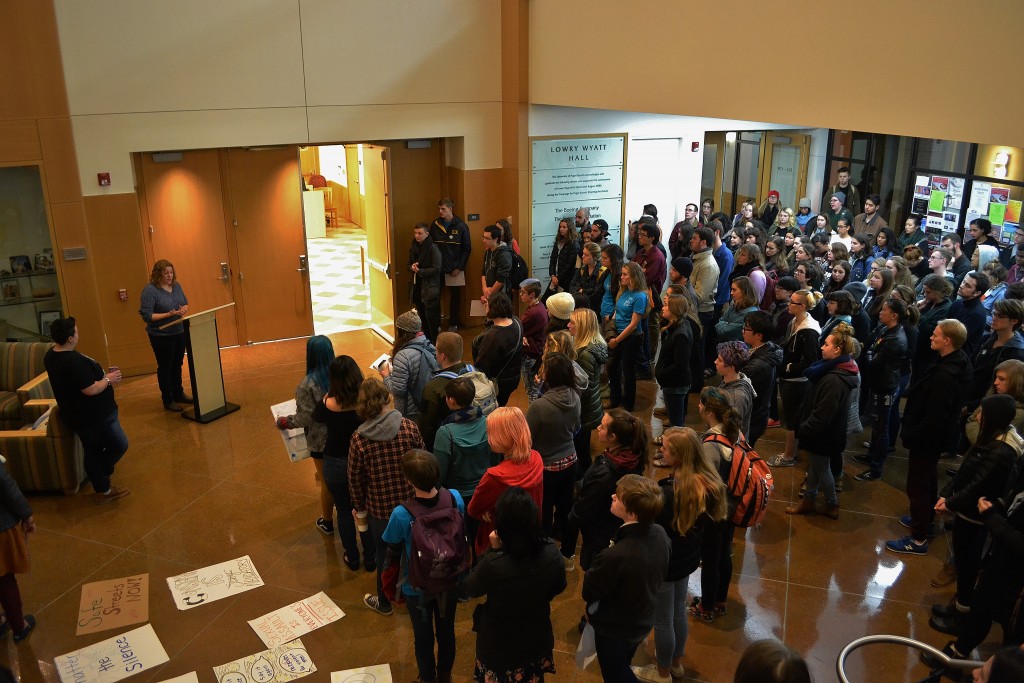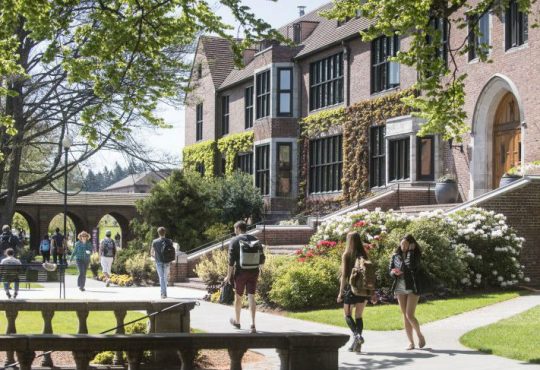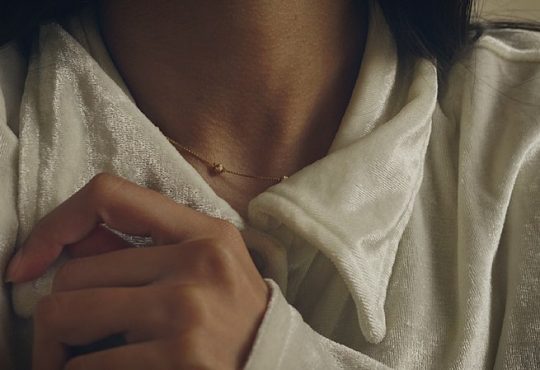
Every two minutes, someone is raped in the United States, and a third of women in Washington State have been raped in their lifetime. 90% of college-aged survivors know their attacker, according to the Washington Coalition of Sexual Assault Programs. According to Security Services’ Annual Report, 7 rapes were reported on or near campus alone, and according to the RAINN (Rape, Abuse and Incest National Network), 68% of rapes go unreported.
It is statistics like these that Take Back the Night (TBTN) aims to change, according to the event’s webpage, which states, “We aim to end sexual assault, domestic violence, dating violence, sexual abuse and all other forms of sexual violence.” The event, a march and “speak out” for survivors of sexual assault and power-based personal violence, occurred at Puget Sound on Nov. 4th.
“The primary goal is to both stand in solidarity with sexual assault survivors and to draw attention to violence on our campus. UPS isn’t exempt from rape culture by any means, so it’s important to actively push back against societal norms defined by violence,” SIRGE coordinator and TBTN organizer Aryeh Conrad said.
“It’s not acceptable that unwanted sexual advances occur at all and it’s disgusting that a significant portion of the human race exhibits a normative attitude toward that behavior,” said sophomore Kyle Miller, an attendee of the event.
Take Back the Night began in the 1970s and has been an event on college campuses ever since, according to Conrad. The event originally was focused on women, but Conrad aimed to have TBTN be an inclusive space in terms of gender identity.
“As a genderqueer survivor, it was extremely important to make the space accessible for all survivors, and not frame the march as a women-only event. Trans and non-binary people are frequently not included in conversations on violence, and men are frequently underrepresented as well—despite people of all gender identities experiencing power-based personal violence. Obviously it’s important to draw attention to the high rates of woman-identified victims, but it’s also important to acknowledge men, and trans & non-binary people,” Conrad said.
The crowd of students attending identified as men, women and many other gender identities, and for some, this gender diversity was a very powerful aspect of the event. “It’s so cool to see cis men here, taking responsibility for the culture we live in and their part in it,” sophomore Sam Bainbridge said, who attended the march this year and last.
Over 200 students showed up to demonstrate their support, making posters that read things like “Shatter the Silence,” “Consent is Necessary” and more. “It’s so wonderful to see more than double the number of people that were here last year,” sophomore Grace Piccard, who has attended Take Back the Nights both years since she began at Puget Sound, said.
The students left from Wyatt and marched through campus shouting chants about ending violence and rape culture. When passing the president’s house, the students yelled, “Out of Ron Thom’s house, into the street! Take Back the Night!” Following the march, University of Washington, Tacoma Professor and sex crimes researcher Alissa Ackerman gave a talk on ending rape culture and the importance of solidarity and empowerment for survivors. “Survivors are all around you. We are everywhere,” Ackerman said.
The event ended with a “speak out” for survivors of sexual assault—an open forum where people shared their stories, often to loud applause.
“There’s something very powerful about spaces where we can come together as survivors and have our experiences validated. So many survivors are afraid to speak out because they think they’re alone, and I hope that I was able to let at least one survivor know that they’re not alone,” Conrad said.
“The most important thing for survivors of sexual assault is to have our voices heard and validated. Having a public forum for that is so special and important,” Piccard said, expressing similar sentiments to Conrad.
“TBTN is about education and empowerment… Of course, the most powerful and most educational component is the sacred storytelling of people’s experiences. I think that is where we all learn the most about how this violence hurts our whole community,” said assistant Dean of Students Marta Palmquist Cady.
Conrad hopes that students will carry their experiences beyond the event and continue to work to end rape and sexual assault. “I hope that people keep getting involved with sexual assault prevention programming. Our work isn’t done until events like TBTN become obsolete and unnecessary—until we live in a world without rape. I hope people refuse to accept rape culture and understand that it’s bigger than just a lot of isolated incidences and going to just one event isn’t enough to dismantle rape culture. Rape culture is pervasive; it’s the words we use, the jokes we say, the refusal to believe victims of violence, the ways in which we conceptualize masculinity as inherently violent that allow rape.


